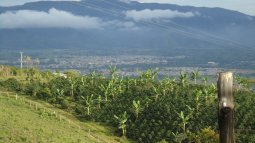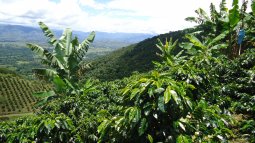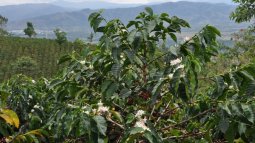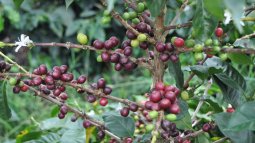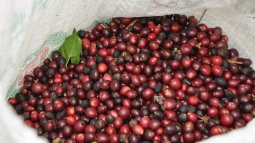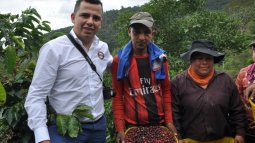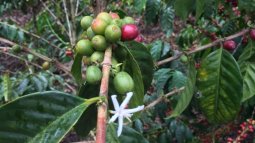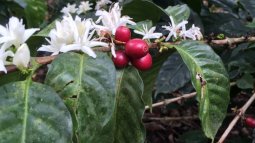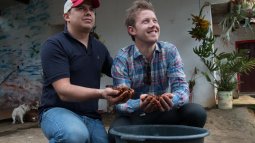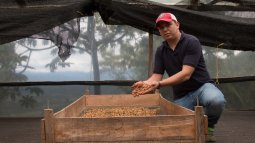Elkin Guzman is a pioneer inthe world of coffee producers.
Hailing from Pitalito, this extremely intelligent young farmer is using new technologies in amazing ways to improve his techniques in terms of cultivation, harvest, and process. The scrutiny and attention to detail that Elkin maintains are undoubtedly paying off as he is now producing some of the most consistently impressive coffees we have ever seen come out of Colombia.
From Elkin:
"During the last year I have been interested more than anything in the production of differentiated coffee or coffees with specialized production processes, such as Natural and Honey; these are processes that require a lot of dedication and care to obtain excellent results, from the picking process - through the process of beneficio, as well as drying, where it is crucial to move the beans frequently to ensure an homogeneous process. Although it is believed that working with coffee is simple, you can get unwanted flavors in cup if you dry the coffee irregularly or if the selection of the cherries is not appropriate in the picking process. The quality of a coffee bean is conditioned by a large number of factors. The peculiarities and specific flavors of each coffee are determined by the circumstances surrounding its growth and production such as the micro-climate and the altitude of the farm, the treatment of soils and trees, the shade received by the trees, the type of harvesting of the cherries and, finally, the production process used. Trying to understand the behavior of the Natural process, where we want to highlight a fruity, sweet and clean profile of coffee, we began to evaluate different picking methods according to the measurement of the degrees of ripening of cherries (degrees brix).
I decided to pick the cherries in the morning hours only. At night and in the early hours of the day coffee trees are performing processes that do not generate high levels of stress or energy expenditure which in turn generates a higher concentration of sugars in the cherries and therefore in the coffee beans. The beneficio process of the farm was standardized: balseo, selection of unripe beans and the drying process. We considered different alternatives for the drying process like using zarandas2 , drying the coffee over the floor, stacking it, without stacking it, changing the duration of the process, among others, and everything changed the cupping results. In the end we gradually discovered the best way to develop this process. The coffee production with the Natural process is complex and temperature and humidity must be controlled very carefully. Cherries should be dehydrated quickly without affecting mucilage quality, which is why we do this process on the same day as picking (in the afternoon hours) to take advantage of the light of day. The coffee is stacked to obtain the process known as "desmiele", where the coffee has water loss in order to open up the pores of excelso coffee and get glucose transfer into the beans (images 1 and 2). This stage takes 8 days, during which the coffee is moved with a rake and stacked again every three hours. After this, we decided to apply the Honey process to the coffee of our farm, with the aim of highlighting the fragrances and the aroma of the coffee and to give smoothness and complexity to its flavor. This is why in this process the coffee is taken to a tank with water to moisten the cherries and thus remove the pulp. The cherries are moistened from 18 to 24 hours and then it is possible to easily peel off their shell and take them to the drying process. At this point, the beans have a red hue and they are deposited in zarandas to finish their drying process lasting between 25 and 30 days, until they reach the optimal levels of humidity. With this process we also seek to improve the coffee milling process and thus facilitate its export. These processes are a new niche in the coffee market and have great potential for success because it saves costs associated with the beneficio process, reduces environmental deterioration by not using water (which makes it a sustainable alternative for the coffee producer and for the environment), and also develops unique and ideal notes to enjoy an excellent cup.
The process is called Natural-Hydra-Honey because it integrates the two processes and additionally uses water for the cherries hydration. The Castillo and Caturra varieties produce good results, however we believe that the Castillo variety is the most stable for this process (its cup results were more consistent); with the Caturra variety more attention is required with the selection of the beans before the drying process, because it is more susceptible to cup defects. For us it is very important to see that we have achieved good results with this process even though it is still evolving. We like to offer different products to the ones offered by others, but always trying to be within the context of coffee productivity in the area, taking care of the environment, getting to know our coffee crops and experimenting with our knowledge, and then applying it at the farms to achieve uniques coffees, in cup and in process. That is how we developed this process, trying to get a good coffee that has the characteristics of the Natural process but at the same time is balanced in its notes. The stage of hydrating the cherries and turning the process into Honey emerged from two needs: first to facilitate the milling process (with a reduction of mechanical damages to the coffee) and second, to stabilize the process, highlight the fragrance and improve the residual flavor in cup. I am sure that this is an innovative process that favors our coffee production by reducing the use of a natural resource as important as water and is an opportunity for coffee producers to be part of a differentiated coffee market. All the processes and research developed at the farm have been possible thanks to the support of Banexport led by Jairo and Julián Ruiz, who trust in our work, support us with resources, equipment and ideas, which are executed at the farm and perform a key role in the development of both the coffee production and the coffee producers."
The Process:
1. Cherries are harvested in the morning@ 23-25° Brix.
2. Cherries are floated to remove impure selection.
3. Cherries are dried on raised beds as naturals for a period of 8 days.
4. Cherries are re-hydrated for a period of 18-24 hours.
5. Cherries are depulped through a traditional beneficio.
6. Coffee is then dried on raised beds as a honey for an average period of 25-30 days.
For more information on Colombian coffees visit our Colombia origin page.



